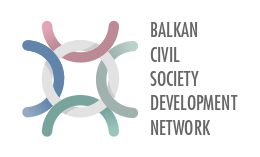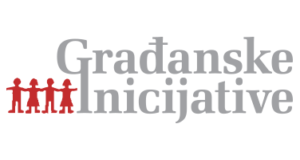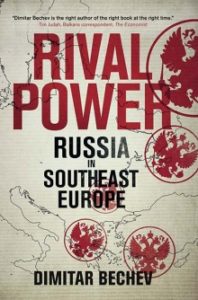It all started with a video posted on social media: a secret recording from 2016 that appears to show a well-known local tycoon hand over an envelope containing bundles of cash to a party associate of Montenegro‘s long-standing leader, The Independent reports:
The prominent businessman, a former close friend and confidant of Montenegrin president Milo Djukanovic, released the video late last year in retaliation for charges filed against him for fraud and money laundering…. The “Envelope Affair” has triggered weeks of anti-Djukanovic protests, demanding the resignation of one of Europe’s longest-lasting leaders after his almost 30 years in power.

RFE/RL
The anti-government demonstrations came as similar protests were taking place in neighbouring Serbia and Albania where demonstrators are also seeking the ouster of leaders they accuse of autocratic rule and corruption despite their proclaimed bids to take their countries into the European Union.
Antigovernment protests were held in the Serbian capital, Belgrade, for the 18th week in a row, with the latest demonstration marked by a minute of silence to honor victims of the 1941 World War II bombing of the capital, RFE/RL adds:
Protesters gathered on April 6 in front of the main government building, then marched toward the city hall, where they erected barricades from material collected from construction sites in the city center. Serbs have been taking to the streets of Belgrade and elsewhere in protest against what they say is President Aleksandar Vucic’s autocratic rule and demanding press freedom and fair elections.
 The erosion of civil society, attacks on human rights, and prospects for democratic renewal are the focus of the annual International Civil Society Week (ICSW), co-hosted by CIVICUS and Serbia’s Civic Initiatives NGO, with the backing of the Balkans Civil Society Development Network.
The erosion of civil society, attacks on human rights, and prospects for democratic renewal are the focus of the annual International Civil Society Week (ICSW), co-hosted by CIVICUS and Serbia’s Civic Initiatives NGO, with the backing of the Balkans Civil Society Development Network.
 Several hundred pro-democracy and human rights advocates meeting in Belgrade April 8 to 12 will hear that Serbia, Afghanistan, Saudi Arabia, and Sudan have been placed on a global watchlist of countries that have seen an “escalation in serious threats to fundamental freedoms in recent weeks and months,” according to CIVICUS Monitor.
Several hundred pro-democracy and human rights advocates meeting in Belgrade April 8 to 12 will hear that Serbia, Afghanistan, Saudi Arabia, and Sudan have been placed on a global watchlist of countries that have seen an “escalation in serious threats to fundamental freedoms in recent weeks and months,” according to CIVICUS Monitor.
Citizens of all five countries are experiencing rights violations that “include killings, attacks on protesters, media restrictions and arbitrary detentions of human rights defenders,” IPS reports.

Civic Initiatives
“It is deeply concerning to see escalated threats to basic rights in these countries,” said Marianna Belalba Barreto, CIVICUS’ Civic Space Research Lead. “It is critical that these five governments wake up to their failure to respect international law and take swift action to respect their citizens’ most basic freedoms in a democratic society,” she said.
Serbia’s Higher Court last week sentenced former state security officials Radomir Marković and Milan Radonjić to 30 years in prison, and Ratko Romić and Miroslav Kurak to 20 years in prison for the murder of Slavko Curuvija, (above), a prominent journalist and editor.
“Slavko Ćuruvijawas a courageous journalist, not afraid to write about sensitive issues during very turbulent times in Serbia,” said OSCE Representative on Freedom of the Media, Harlem Désir. “He paid the highest price for his journalistic work and that is why it is of utmost importance that justice is served. This long-awaited ruling is significant, as it shows that there can be no impunity even for crimes committed 20 years ago.”
Curivija, 51, was shot and killed on April 11, 1999, outside his home near the Yugoslav Parliament building. He was the owner of the mass-circulation Dnevni Telegraf, Serbia’s first private daily, and the weekly magazine Evropljanin, independent regional news website Balkan Insight reported, said the Committee to Protect Journalists (CPJ).
“We welcome decision of the Serbian court to sentence the four perpetrators responsible for the killing of Slavko Ćuruvija, a journalist and an outspoken critic of Slobodan Milosevic’s regime, to lengthy jail terms 20 years after the murder. Serbian authorities should continue to work toward complete justice by identifying those who ordered the murder and pursuing their prosecution,” ” said CPJ Europe and Central Asia Program Coordinator Gulnoza.

Pardee School of Global Studies
The National Endowment for Democracy supports the Slavko Curuvija Foundation, which honors his name by supporting local media and training young journalists. Another NED partner, Balkan Insight, compiled an archive of his life and work.
The European Union will enhance its engagement with the Western Balkans when Germany assumes the EU Presidency next year, according to Michael Roth, its Minister of State for Europe. The EU’s strategic interest in the Western Balkans must be maintained to secure stability, security and regional conciliation since the EU “is not a common market or an economic project, but a community of values”, he added.
 Is China’s Belt and Road Initiative benign or a Trojan Horse for Beijing’s autocratic model? While it has has prompted a range of reactions, China’s ‘silk road’ overtures in the region are exploiting the void between EU strategy, CEE interests and ordinary citizens, argues analyst Emilija Tudzarovska Gjorgjievska.
Is China’s Belt and Road Initiative benign or a Trojan Horse for Beijing’s autocratic model? While it has has prompted a range of reactions, China’s ‘silk road’ overtures in the region are exploiting the void between EU strategy, CEE interests and ordinary citizens, argues analyst Emilija Tudzarovska Gjorgjievska.
“For decades, the CEE countries have been trying to root out corruption from their political systems,” she contends. “The quick transition to liberal market economies did not create sufficient opportunities to fill the void between wealth, solidarity and poverty, or to rebuild their economic capacities.”
In geostrategic terms, NATO’s open door policy and the expansion of democracy and stability in the Balkans “closes the door” on the influence of other illiberal actors, such as Russia [as detailed by Dimitar Bechev, left], according to Ambassador Vesko Garcevic (above, right), Professor of the Practice of International Relations at Boston University.
He addressed a panel discussion on “NATO and Promotion of Democracy In The Western Balkans,” on Capitol Hill in Washington D.C. on April 3, alongside fellow panelists Reuf Bajrovic, former Minister of Energy, Mining and Industry for Bosnia and Herzegovina; [former NED program officer] Richard Kraemer, Fellow at the Foreign Policy Research Institute at the University of Pennsylvania; and Metodija Koloski, President of the United Macedonian Diaspora, BU”s Frederick S. Pardee School of Global Studies reports.
Nominations are open for the Future Policy Award for exemplary policies that promote and support young people’s empowerment. Every year, the most visionary policies tackling humankind’s most pressing challenges are celebrated through the Future Policy Award (FPA), the only global award that recognises policies for the benefit of present and future generations.
Representatives of international organizations, academia, non-governmental organizations, parliaments, government agencies, and others have until the 26th April to nominate exemplary policies through the online form (available in English, at http://bit.do/eNoZb) or with a word version of the form (available on request, in English, French and Spanish, at: fpa@worldfuturecouncil.org). Winners will be selected by a high-level jury of experts and announced in October 2019 at an award ceremony in Belgrade, Serbia, during the 141st IPU Assembly. For further information, go here.







